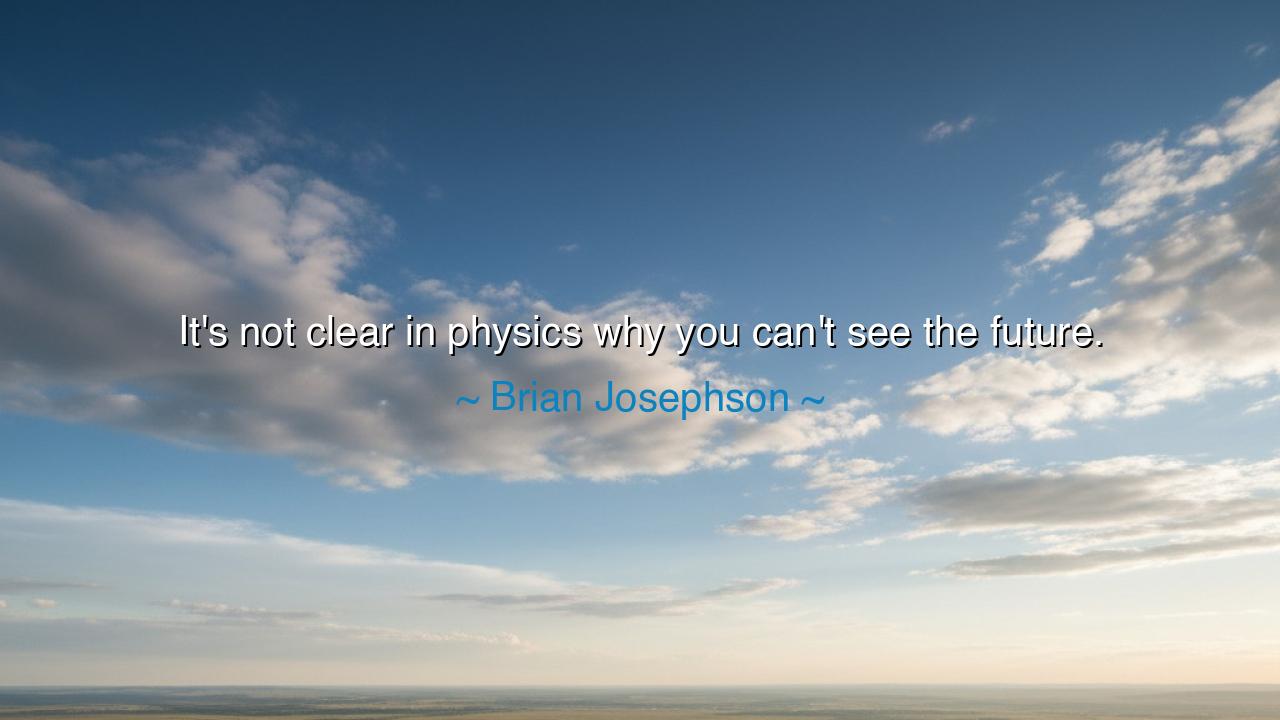
It's not clear in physics why you can't see the future.






"It's not clear in physics why you can't see the future." – these words by the esteemed physicist Brian Josephson speak to the very nature of our existence, to the questions that have haunted the human mind for centuries. They touch upon the boundary of knowledge and mystery, the limits of human perception, and the ever-elusive realm of time. The very fact that time flows forward without our ability to gaze upon it — to know what lies ahead — presents a paradox, one as old as the first philosophers who contemplated the nature of the world.
In the ancient world, time was seen as a river, flowing endlessly from the past into the future, never to be reversed. The great Heraclitus, who spoke of the "flux" of all things, recognized that the river of time is ever-changing, yet fixed. Time was something to be understood through reflection on the present and the past, yet the future was a place unseen, obscured by the very fabric of existence itself. To see the future, in his view, was akin to drinking from a cup that never reaches your lips.
Josephson's words echo the same mystery, suggesting that physics, the language we use to understand the universe, cannot yet explain why the future remains veiled. Even in the age of the greatest scientific advancements, where particles are split, and the quantum realm is explored, the future remains elusive. Could it be that time, like a river, is a force beyond our comprehension, flowing in a direction that is both unyielding and unknowable?
Take, for instance, the tale of Hercules, the ancient hero, who was tasked with performing twelve labors, each more difficult than the last. What if Hercules had known the future? Would he have been as brave? Would his actions, driven by the unknown, have held the same grandeur, the same heroism? It is the uncertainty of the future, the absence of clarity about what is to come, that often calls forth the strength within us. For Hercules, as for all of us, the journey is not in knowing the outcome, but in the courage to take each step forward, knowing that the future is unseen.
Science, with all its equations and measurements, may offer us the tools to understand the past and present, but it has yet to uncover the reason behind our inability to see the future. Even the greatest minds, like Albert Einstein, grappled with the nature of time. Theories of relativity tell us that time is not a constant, but a malleable force that bends and warps. And yet, this bending still does not offer a glimpse into what comes next. Perhaps it is the very nature of existence itself that keeps the future locked away, a challenge that no law of physics can overcome.
In a sense, the inability to see the future is a gift. It is a call to faith, to patience, and to courage. If we knew the future, would we act differently? Would we become paralyzed by what is to come, or would we be emboldened by the certainty of victory? Perhaps it is in the struggle, in the uncertainty, that we find meaning. The great philosopher Socrates said, "An unexamined life is not worth living." It is in the examination of our present, in our actions today, that we carve the path toward our future.
So, what lesson can we take from Josephson’s observation? Embrace uncertainty. Do not fear the unknown, but find strength in it. The future is not a place to be feared or avoided, but a realm of possibility, open to the brave and the bold. In life, as in physics, the greatest discoveries are not always those that are seen, but those that are experienced through our actions, our courage, and our willingness to move forward into the unknown. Take that first step, for the journey ahead is as much about who you become as it is about where you go. And remember, the future is not a destination, but a path, ever unfolding before you.






AAdministratorAdministrator
Welcome, honored guests. Please leave a comment, we will respond soon